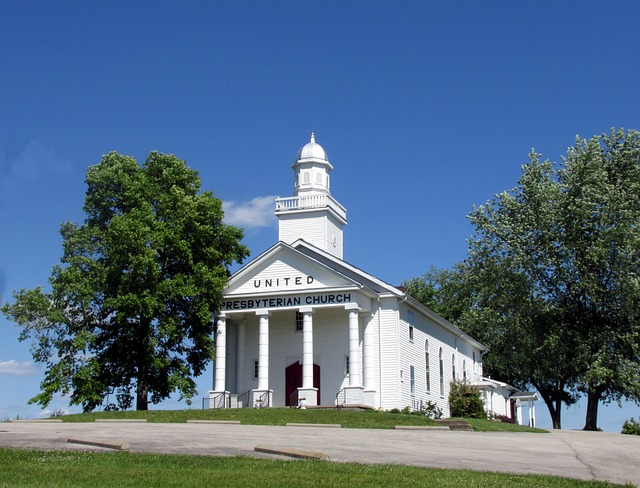Presbyterian Church (USA) is a mainline Protestant denomination in the United States. While it encompasses a diverse range of theological perspectives, it is generally considered a mainline denomination rather than an evangelical one.
Table of Contents
The History and Beliefs of the Presbyterian USA Denomination
The Presbyterian USA denomination has a rich history and a set of beliefs that have shaped its identity over the years. Many people wonder if this denomination can be considered evangelical, given its theological stance and practices. To answer this question, it is important to delve into the history and beliefs of the Presbyterian USA denomination.
The roots of the Presbyterian USA denomination can be traced back to the Protestant Reformation in the 16th century. It was during this time that John Calvin, a French theologian, developed the theological framework that would later influence Presbyterianism. Calvin’s teachings emphasized the sovereignty of God, the authority of Scripture, and the need for personal conversion. These principles became foundational to the Presbyterian faith.
Presbyterianism made its way to the United States in the 17th century, with the arrival of Scottish and Irish immigrants. The first presbytery was established in Philadelphia in 1706, marking the beginning of the Presbyterian Church in America. Over time, the denomination grew and spread throughout the country, eventually becoming known as the Presbyterian USA denomination.
One of the key beliefs of the Presbyterian USA denomination is the authority of Scripture. Presbyterians believe that the Bible is the inspired word of God and serves as the ultimate guide for faith and practice. This belief aligns with the evangelical emphasis on the importance of Scripture in shaping one’s beliefs and actions.
Another important aspect of the Presbyterian USA denomination is its commitment to social justice and activism. Presbyterians have a long history of advocating for civil rights, gender equality, and other social issues. This commitment to social justice is often seen as a defining characteristic of evangelicalism, as evangelicals are known for their involvement in social and political causes.
However, there are some theological differences between the Presbyterian USA denomination and other evangelical denominations. For example, Presbyterians believe in the doctrine of predestination, which states that God has already determined who will be saved. This belief sets them apart from some evangelical groups that emphasize the individual’s role in accepting or rejecting salvation.
Additionally, the Presbyterian USA denomination has taken progressive stances on certain social issues, such as LGBTQ+ rights and the ordination of women. While some evangelicals may hold similar views, there are others who adhere to more conservative interpretations of Scripture on these matters. These differences in theological and social positions can sometimes create tension between the Presbyterian USA denomination and other evangelical groups.
In conclusion, the Presbyterian USA denomination has a unique blend of evangelical and progressive beliefs. While it shares some commonalities with evangelicalism, such as a commitment to Scripture and social justice, there are also theological and social differences that set it apart. Ultimately, whether or not one considers the Presbyterian USA denomination to be evangelical depends on how one defines and understands evangelicalism.
Understanding the Evangelical Movement within Presbyterian USA

Is Presbyterian USA evangelical? This is a question that has sparked much debate and discussion within the Presbyterian community. To understand the answer, it is important to have a clear understanding of the evangelical movement within Presbyterian USA.
The term “evangelical” is often associated with conservative Christianity and a strong emphasis on the authority of the Bible. However, within Presbyterian USA, the term has a broader meaning. It encompasses a range of theological perspectives and practices that are rooted in the Reformed tradition.
One key aspect of the evangelical movement within Presbyterian USA is a commitment to the authority of Scripture. Evangelicals believe that the Bible is the inspired word of God and the ultimate source of truth. They seek to interpret and apply its teachings in all areas of life, including faith and practice.
Another important characteristic of evangelicalism within Presbyterian USA is a focus on personal conversion and faith in Jesus Christ. Evangelicals emphasize the need for individuals to have a personal relationship with Jesus and to experience a transformative encounter with Him. This emphasis on personal faith is often expressed through evangelistic outreach and a desire to share the good news of Jesus with others.
In addition to these theological commitments, evangelicalism within Presbyterian USA is also characterized by a strong emphasis on social justice and engagement with the world. Evangelicals believe that faith should not be confined to the walls of the church but should be lived out in the world. They are often involved in various social justice causes, such as fighting poverty, promoting racial reconciliation, and advocating for the rights of the marginalized.
It is important to note that while evangelicalism is a significant movement within Presbyterian USA, it is not the only perspective. The Presbyterian Church (USA) is a diverse denomination with a wide range of theological beliefs and practices. There are those who identify as evangelical, as well as those who identify as more liberal or progressive in their theology.
Despite this diversity, evangelicalism within Presbyterian USA has had a significant impact on the denomination. Many of its leaders and influential figures have been associated with the evangelical movement. They have played a key role in shaping the denomination’s theology, worship practices, and mission.
In recent years, there has been some tension and disagreement within Presbyterian USA regarding the role of evangelicalism. Some have expressed concerns that the denomination is becoming too liberal and straying from its evangelical roots. Others argue that the denomination needs to be more inclusive and open to different theological perspectives.
In conclusion, while Presbyterian USA is a diverse denomination with a range of theological beliefs, evangelicalism is a significant movement within the denomination. It is characterized by a commitment to the authority of Scripture, a focus on personal conversion and faith in Jesus Christ, and a strong emphasis on social justice and engagement with the world. While there may be disagreements and tensions within the denomination regarding the role of evangelicalism, it continues to shape and influence the Presbyterian community.
Examining the Relationship between Presbyterian USA and Evangelicalism
Is Presbyterian USA evangelical? This is a question that has sparked much debate and discussion among theologians and churchgoers alike. To truly understand the relationship between Presbyterian USA and evangelicalism, it is important to delve into the history and beliefs of both.
Presbyterian USA, also known as the Presbyterian Church (USA), is a mainline Protestant denomination that traces its roots back to the Reformation. It is a diverse denomination with a rich history and a wide range of theological perspectives. Evangelicalism, on the other hand, is a movement within Christianity that emphasizes the authority of the Bible, personal conversion, and the spreading of the gospel.
At first glance, it may seem that Presbyterian USA and evangelicalism are at odds with each other. After all, the term “evangelical” is often associated with conservative beliefs and practices, while Presbyterian USA is known for its progressive stance on social issues. However, it is important to note that not all Presbyterians are the same, and there is a spectrum of beliefs within the denomination.
While some Presbyterians may identify as evangelical and align themselves with the core tenets of evangelicalism, others may not. This is because Presbyterian USA has a long history of theological diversity and allows for a wide range of beliefs within its congregations. Some Presbyterian USA churches may embrace evangelical beliefs and practices, while others may lean more towards a liberal or progressive interpretation of Christianity.
One of the key factors that sets Presbyterian USA apart from other evangelical denominations is its approach to scripture. While evangelicals generally hold a high view of the Bible and believe in its literal interpretation, Presbyterians tend to take a more nuanced approach. They emphasize the importance of studying scripture in its historical and cultural context, and they value the insights of biblical scholarship.
Another area where Presbyterian USA and evangelicalism may differ is in their approach to social issues. Evangelicals are often associated with conservative positions on issues such as abortion, homosexuality, and gender roles. Presbyterian USA, on the other hand, has taken a more progressive stance on these issues, advocating for LGBTQ+ rights and women’s ordination.
Despite these differences, it is important to remember that Presbyterian USA and evangelicalism are not mutually exclusive. There are many Presbyterians who identify as evangelical and embrace the core tenets of evangelicalism. Likewise, there are evangelicals who are members of Presbyterian USA churches and find a home within the denomination.
Ultimately, the relationship between Presbyterian USA and evangelicalism is complex and multifaceted. While there are certainly differences in beliefs and practices, there is also room for overlap and common ground. It is up to each individual Presbyterian and each individual evangelical to define their own beliefs and navigate their own spiritual journey.
In conclusion, the question of whether Presbyterian USA is evangelical is not a simple one. It depends on how one defines evangelicalism and how one interprets the beliefs and practices of Presbyterian USA. While there are certainly differences between the two, there is also room for dialogue and understanding. At the end of the day, what matters most is not the label we put on ourselves, but the love and grace we extend to one another as followers of Christ.
Exploring the Controversies and Debates Surrounding Presbyterian USA’s Evangelical Identity
Is Presbyterian USA evangelical? This question has sparked numerous controversies and debates within the religious community. To fully understand the complexities of this issue, it is important to delve into the history and beliefs of Presbyterian USA.
Presbyterian USA is a branch of the Presbyterian Church in the United States of America. It traces its roots back to the Protestant Reformation in the 16th century, when John Calvin’s teachings heavily influenced the formation of the Presbyterian tradition. Calvin emphasized the sovereignty of God, the authority of Scripture, and the importance of predestination.
However, over the years, the Presbyterian Church in the United States of America has undergone significant changes. Some argue that these changes have led to a departure from its evangelical roots. One of the key points of contention is the church’s stance on social issues.
Presbyterian USA has been at the forefront of advocating for social justice and equality. It has taken progressive positions on issues such as LGBTQ+ rights, gender equality, and racial justice. This has led some to label the church as liberal and question its evangelical identity.
On the other hand, proponents of Presbyterian USA argue that the church’s commitment to social justice is deeply rooted in its evangelical beliefs. They believe that the gospel calls for the pursuit of justice and the love of neighbor. In their view, being evangelical means actively working towards a more just and inclusive society.
Another area of controversy is the church’s approach to biblical interpretation. Presbyterian USA is known for its commitment to the authority of Scripture, but it also recognizes the importance of interpreting the Bible in its historical and cultural context. This has led to differing interpretations on issues such as the ordination of women and the acceptance of same-sex relationships.
Critics argue that this approach to biblical interpretation undermines the church’s evangelical identity. They believe that a more conservative and literal interpretation of Scripture is necessary to maintain evangelical beliefs. However, supporters of Presbyterian USA contend that a nuanced and contextual understanding of the Bible is essential for a faithful interpretation.
Despite these debates, Presbyterian USA continues to be a diverse and vibrant denomination. It encompasses a wide range of theological perspectives, from conservative to liberal. This diversity is reflected in the various worship styles, theological emphases, and social justice initiatives within the denomination.
Ultimately, whether or not Presbyterian USA is considered evangelical depends on one’s definition of the term. If evangelicalism is understood as a strict adherence to conservative theology and biblical interpretation, then the church may not fit within that framework. However, if evangelicalism is seen as a commitment to the gospel and the pursuit of justice, then Presbyterian USA can certainly be considered evangelical.
In conclusion, the question of whether Presbyterian USA is evangelical is a complex and contentious one. The church’s commitment to social justice and its approach to biblical interpretation have sparked debates and controversies. However, it is important to recognize the diversity within the denomination and the various ways in which individuals understand and live out their faith. Ultimately, the answer to this question may vary depending on one’s perspective and definition of evangelicalism.
Conclusion
No, Presbyterian USA is not considered evangelical.


